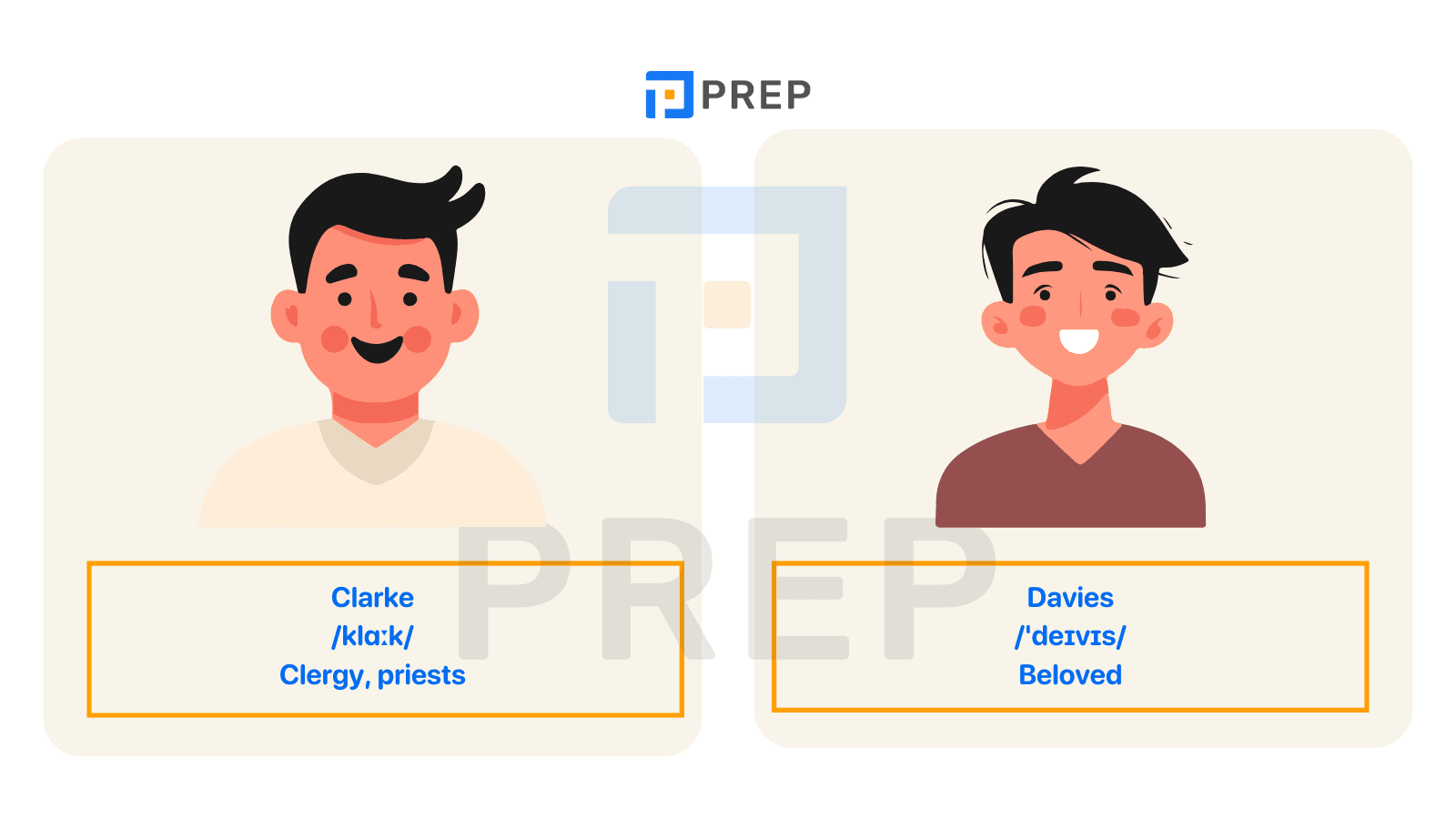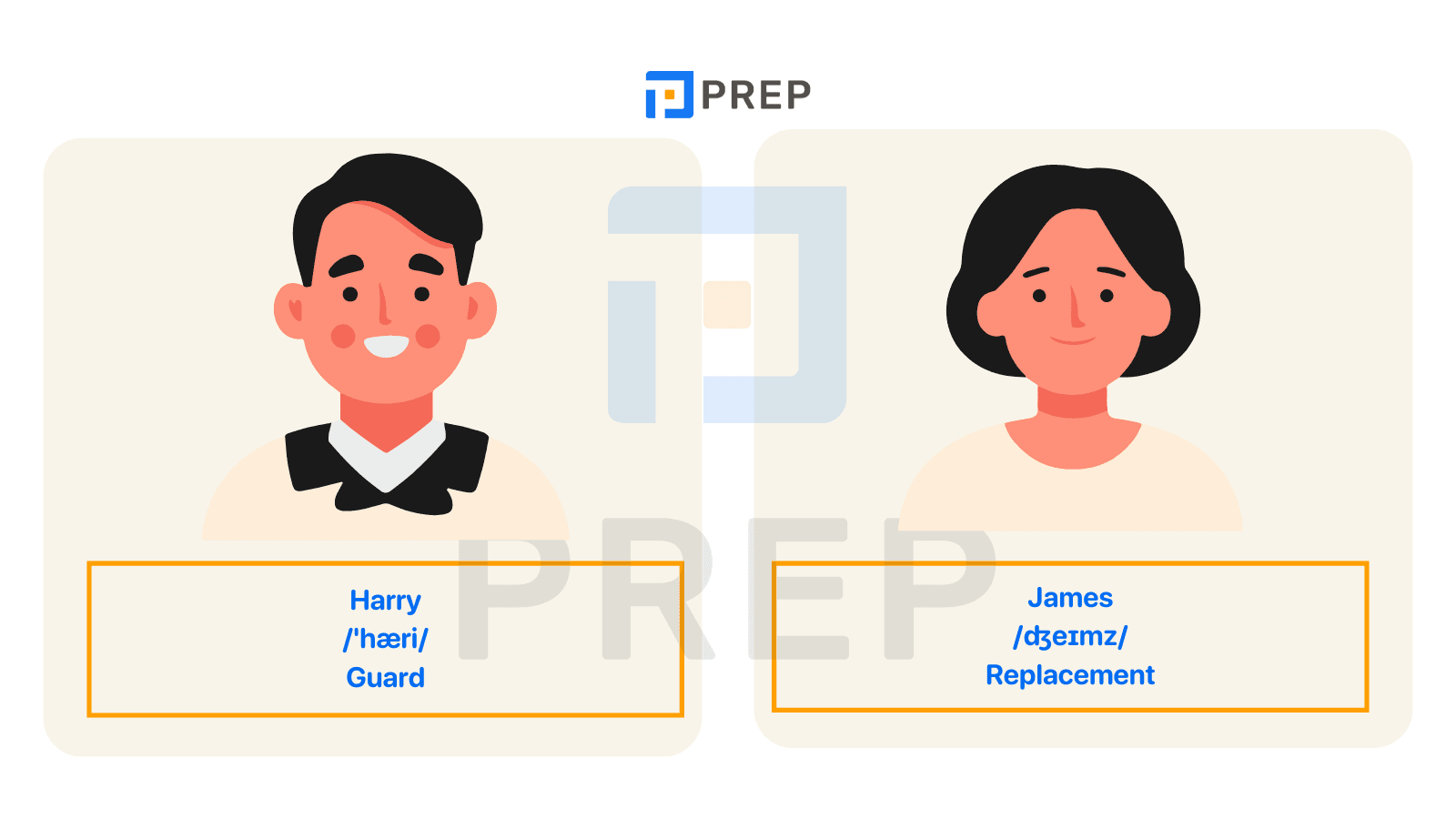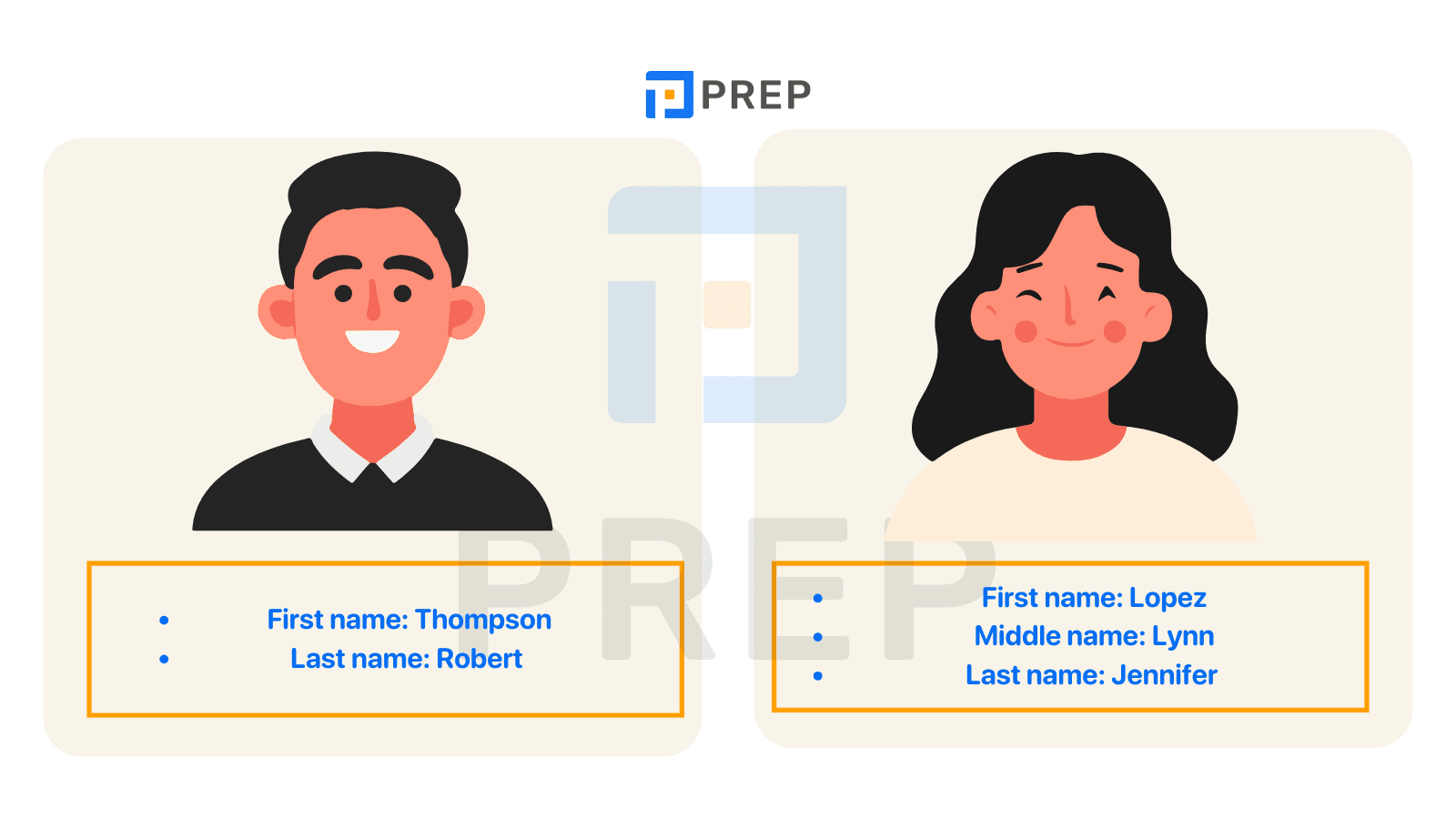A complete guide to pronounce names in English accurately
Understanding the correct order and the ways to pronounce names in English is essential, whether you're preparing for a test or communicating in everyday life. In this guide, we’ll explore the rules for pronouncing names, the components of an English name, and specific situations where pronunciation varies.
- I. Components of an English name: First, Middle, and Last Names
- II. English Names in the IELTS Listening Part 1 Test
- III. Common English Surnames and First Names
- IV. A detailed guide to pronounce names in English
- V. Common ways to ask and answer questions about names
- VI. Practice exercises for the ways to pronounce names in English

I. Components of an English name: First, Middle, and Last Names
In English, a person’s name typically consists of three parts: First Name, Middle Name, and Last Name.
-
First Name (Given Name/Forename)
-
Middle Name (Initial of Middle Name)
-
Last Name (Family Name/Surname)
How do you pronounce a name? For example, in the name Barack Hussein Obama:
-
First name: Barack
-
Middle name: Hussein
-
Last name: Obama
II. English Names in the IELTS Listening Part 1 Test
In the IELTS Listening Test (Part 1), a key section evaluates your ability to comprehend and transcribe names. This part often requires you to listen carefully and fill in personal information, including names.
For instance, candidates might be asked to complete a form where the "family name" is equivalent to the "last name".
III. Common English Surnames and First Names
Familiarity with common English names can make pronunciation easier. Here are some examples:
1. Common English surname
Here is the list of most common English surnames:
|
Surname |
Pronunciation |
Meaning |
|
Smith |
/ smɪθ / |
Blacksmith |
|
Clarke |
/klɑːk/ |
Clergy, priests |
|
Williams |
/wɪljəm/ |
Brave warriors |
|
Brown |
/braʊn/ |
The color of brown |
|
Taylor |
/ˈteɪlə/ |
Tailor |
|
Davies |
/ˈdeɪvɪs/ |
Beloved |
|
Lee |
/liː/ |
Grassland, picturesque |
|
Evans |
/ˈɛvənz/ |
Holy as God |
|
Thomas |
/ˈtɒməs/ |
Twin |
|
Roberts |
/ˈrɒbəts/ |
Famous people |

2. Common English first name
Here are some common English first names:
|
Name |
Pronunciation |
Meaning |
|
Oliver |
/ˈɒlɪvə/ |
Olive tree |
|
Jack |
/ʤæk/ |
The son |
|
Harry |
/ˈhæri/ |
Guard |
|
Jacob |
/ˈʤeɪkəb/ |
Strong |
|
Charlie |
/ˈʧɑːli/ |
Innocent |
|
Thomas |
/ˈtɒməs/ |
Pardoner |
|
George |
/ʤɔːʤ/ |
A strong take off |
|
Oscar |
/ˈɒskə/ |
A happy and lively person |
|
James |
/ʤeɪmz/ |
Replacement |
|
William |
/ˈwɪljəm/ |
Strong, steadfast |

Memorizing these names helps improve pronunciation and allows you to recognize patterns in English name structures.
IV. A detailed guide to pronounce names in English
Here are the essential guidelines to pronounce names in English:
1. Pronouncing names according to structure
Names are generally pronounced in this order:
First Name – Middle Name – Last Name
How do you say a name? For example:
How to pronounce names in English – Robert Thompson
-
First name: Thompson
-
Last name: Robert
How to pronounce names in English – Jennifer Lynn Lopez
-
First name: Lopez
-
Middle name: Lynn
-
Last name: Jennifer

2. Pronouncing names in special contexts
When addressing someone by name in English, the title used may depend on their relationship status or context:
-
For men: Use "Mr." before the name (e.g., Mr. Smith).
-
For unmarried women: Use "Miss" (e.g., Miss Taylor).
-
For married women: Use "Mrs." (e.g., Mrs. Johnson), as women often adopt their husband's last name upon marriage.
3. Important notes on name pronunciation
Some names, particularly those related to historical figures, religious names, or foreign names, might follow older spelling rules. These can sometimes influence how names are pronounced. Here are some name pronunciation apps:
V. Common ways to ask and answer questions about names
Knowing how to ask for and provide names in English is useful for daily conversations. Here are some typical questions:
|
Asking for a name |
Providing a name |
|
What’s your name? |
My name’s…. or I’m…. |
|
What is your full name? |
My full name is…. |
|
What is your first name? |
My first name is… |
|
What should I call you? |
Call me (name)… |
|
Is it okay if I call you + the nickname? |
Yes, It’s ok! |
VI. Practice exercises for the ways to pronounce names in English
To solidify your understanding, try completing these exercises on name pronunciation. Detailed answers are provided to help you assess your progress.
Listening file: HERE
Question: Listen and fill in the blank
The detailed answers
|
AMBER: Hello William. This is Amber – you said to phone if I wanted to get more information about the job agency you mentioned. Is now a good time? WILLIAM: Oh, hi Amber. Yes. Fine. So the agency I was talking about is called Bankside – they’re based in Docklands – I can tell you the address now – 497 Eastside. AMBER: OK, thanks. So is there anyone in particular I should speak to there? WILLIAM: The agent I always deal with is called Becky Jamieson. AMBER: Let me write that down – Becky … WILLIAM: Jamieson (Q1) J-A-M-I-E-S-O-N. AMBER: Do you have her direct line? WILLIAM: Yes, it’s in my contacts somewhere – right, here we are: 078 double 6, 510 triple 3. I wouldn’t call her until the afternoon (Q2) if I were you – she’s always really busy in the morning trying to fill last-minute vacancies. She’s really helpful and friendly so I’m sure it would be worth getting in touch with her for an informal chat. AMBER: It’s mainly clerical and admin jobs they deal with, isn’t it? WILLIAM: That’s right. I know you’re hoping to find a full-time job in the media eventually – but Becky mostly recruits temporary staff for the finance sector – which will look good on your CV – and generally pays better too. AMBER: Yeah – I’m just a bit worried because I don’t have much office experience. WILLIAM: I wouldn’t worry. They’ll probably start you as a receptionist, or something like that. So what’s important for that kind of job isn’t so much having business skills or knowing lots of different computer systems – it’s communication (Q3) that really matters – so you’d be fine there. And you’ll pick up office skills really quickly on the job. It’s not that complicated. AMBER: OK, good. So how long do people generally need temporary staff for? It would be great if I could get something lasting at least a month. WILLIAM: That shouldn’t be too difficult. But you’re more likely to be offered something for a week(Q4) at first which might get extended. It’s unusual to be sent somewhere for just a day or two. AMBER: Right, I’ve heard the pay isn’t too bad – better than working in a shop or a restaurant. WILLIAM: Oh yes – definitely. The hourly rate (= per hour) is about £10 (Q5), 11 if you’re lucky AMBER: That’s pretty good. I was only expecting to get eight or nine pounds an hour. ———————————————— WILLIAM: Do you want me to tell you anything about the registration process? AMBER: Yes, please. I know you have to have an interview. WILLIAM: The interview usually takes about an hour and you should arrange that about a week in advance. AMBER: I suppose I should dress (= wear) smartly if it’s for office work – I can probably borrow a suit (Q6) from Mum WILLIAM: Good idea. It’s better to look too smart than too casual. AMBER: Will I need to bring copies of my exam certificates or anything like that? WILLIAM: No – they don’t need to see those, I don’t think. AMBER: What about my passport? (Q7) WILLIAM: Oh yes – they will ask to see that. AMBER: OK. WILLIAM: I wouldn’t get stressed about the interview though. It’s just a chance for them to build a relationship with you – so they can try and match you to a job which you’ll like. So there are questions about personality (Q8) that they always ask candidates – fairly basic ones. And they probably won’t ask anything too difficult like what your plans are for the future. AMBER: Hope not. WILLIAM: Anyway, there are lots of benefits to using an agency – for example, the interview will be useful because they’ll give you (= you receive) feedback (Q9) on your performance so you can improve next time. AMBER: And they’ll have access to jobs which aren’t advertised. WILLIAM: Exactly – most temporary jobs aren’t advertised. AMBER: And I expect finding a temporary job this way takes a lot less time (Q10) – it’s much easier than ringing up individual companies. WILLIAM: Yes indeed. Well I think… (This detailed explanation of the answers is provided by Prep) |
Mastering the ways to pronounce names in English is a crucial skill, particularly for those taking language proficiency tests like IELTS. By following the guidelines and practicing regularly, you can improve both your communication skills and your performance on tasks like the IELTS Listening Part 1.

Hi I'm Chloe, and I am currently serving as an Product Content Administrator at Prep Education. With over five years of experience in independent online IELTS study and exam preparation, I am confident in my ability to support learners in achieving their highest possible scores.
Comment
Premium content
View allPersonalized roadmap
Most read












